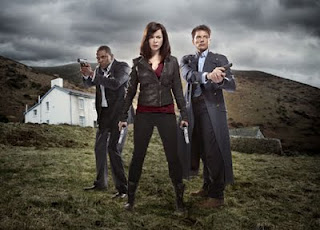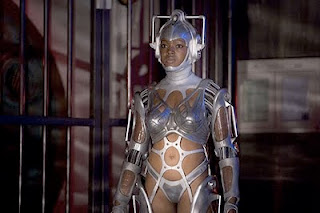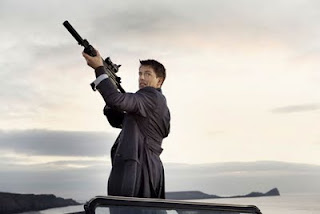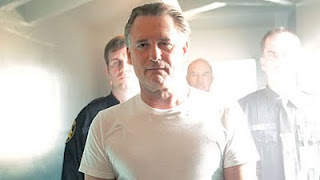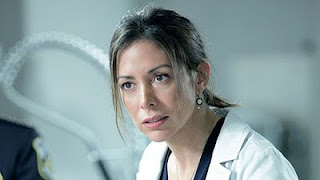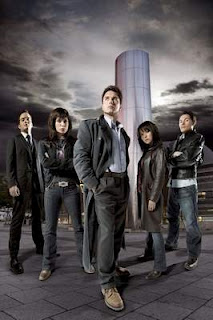James Willetts aims his bazooka of truth at the low flying helicopter that is Torchwood: Miracle Day.
Ever since RTD launched Torchwood as a spin off for Captain Jack in an attempt to make a more adult science fiction show, the programme has struggled to find a format that works. ‘Miracle Day’ is the latest attempt to keep Torchwood relevant, coming after two largely ignored seasons of varying quality, and a miniseries that was a critical success.
Following the idea of ‘Children of Earth’, a single storyline over a shorter amount of time, T:MD is a chance to prove that the achievements of the previous itineration have not been lost. More crucially, it’s a chance to prove that serious science fiction (or at least adult science fiction) can work. Since the last Torchwood there have been few attempts to launch big budget science fiction series other than the execrable Outcasts, and there seems to be no sign that the success of the last miniseries has sparked a surge in the desire for further science fiction output. Even as Doctor Who continues to hold strong (or lose ground, or plummet towards inevitable disaster, depending on who you listen to) other franchises have found it difficult to gain a foothold.
Beyond the British market there has been no new Battlestar Galactica or Lost, no great new American sci-fi series to push boundaries and draw in a new viewership. Only Falling Skies or The Walking Dead, two series with a more survivalist bent than most classic sci-fi, seem to have a chance of making that transition. For all their brilliance Eureka and Fringe still languish in the Firefly zone of well regarded but often overlooked programming.
It’s a real shame. Sci-fi has always been the most difficult genre to transpose from page to screen, and original ideas for series seem to revolve almost solely around outer space adventures (Star Trek, Stargate, Farscape). With the success of Doctor Who and a stronger Torchwood came the chance to rebrand sci-fi as a legitimate area of mainstream programming. Alas, all that promise seems to have fallen by the wayside. Whilst it’s lovely to celebrate the return of Torchwood, you can never be quite sure which version will turn up – the campy mystery of Series One is a far cry from the dark horror of ‘Children of Earth’, and both have their fans.
Thankfully, ‘Miracle Day’ seems to be more in the vein of the latter, although so far it’s not been quite so dark. Recently however, Torchwood has faced a larger challenge than just indifference to sci-fi. As the mainstream and family-friendly Doctor Who has crept towards more adult story telling, Torchwood has been robbed of its purpose. Mature themes, scary villains, on screen death; all have crept into Moffat’s retooled Who, and with the wilfully ‘difficult’ plotlines, twists and last minute reveals, the original series has far surpassed its offshoot. The question now is whether Torchwood even deserves a slot like this. Personally, I think it does (there are still some boundaries that Doctor Who will not cross, and there are scenes in ‘Miracle Day’ that would be as shocking and unimaginable in DW as anything in ‘Children of Earth’) but I can imagine this series as being a test of just where the idea can be taken in the wake of Doctor Who growing up.
Unsurprisingly then, especially considering the BBC’s attempt to crack the American market, Torchwood has been wedded off to the states, securing funding for a bigger budget in return for which the Torchwood team can work with the CIA. This is the biggest problem that the storyline faces as, in place of slow burn horror, we get a hybrid of 24 and The X-Files which is more high concept than high drama, and more interesting in theory than in practice*. Everything in this first episode feels like we’ve seen it before, usually in the preceding series.
The set up – all death ceases, freeing all those busy dying to get on with being horribly damaged, sick or incapacitated – is swiftly dealt with in favour of showcasing the American cast who are the kind of secondary ciphers that RTD specialises in (the ambitious CIA agent, his resourceful assistant/colleague, etc). Where Torchwood shines is in its Welsh contingent*. Eve Myles has long been the best thing about the show and Gwen Cooper’s position as retired agent on the run, holed up in the house from the end of 28 Days Later, is an excellent idea. The inclusion of Rhys as an ever unwilling accomplice provides some much needed comedy and an emotional heart to the story that would be lacking with just Jack and the CIA.
Captain Jack meanwhile is as bland as ever, more at home in the set piece moments (see Jack run, see Jack jump, see Jack shoot a machine gun from the roof of a car) than any sequence involving dialogue. In fairness this has always been John Barrowman’s role, all the way back to his first appearances in Doctor Who. He serves as the muscle to Gwen’s heart, the man who thinks he’s Han Solo but is closer to Luke. That’s not to say that he doesn’t do it well though – he looks as much at home in the American setting as he ever did on the rooftops of Cardiff.
But most interesting of all the new additions is EVIL Bill Pullman in his best role since I:D4. A paedophile child murderer (RTD being anything but subtle, and you get the feeling that the character was only one script edit away from strangling a puppy on screen) who survives thanks to the lack to dying and the affably inept Governor’s office that decides that releasing a known child murderer is a course of action that will result in fewer law suits than keeping him in prison away from the hundreds of thousands of young girls he has a predilection for. The fact that Pullman plays him as less an evil genius and more a palsied wretch only makes his innate horribleness more convincing – this is not the kind of cookie cutter characterisation that RTD has given his paper thin CIA agents.
There is very little introduction given for the sake of non-Torchwood followers. No one ever quite explains who Jack is, or why him being hurt is such a big deal. The assumption is that, if you’re watching by this point, you know that Jack is an unstoppable alien Lazarus. At the same time the origins and purpose of Torchwood are explained, as is the location of Wales, just in case you’re struggling to remember where EVERY SINGLE EPISODE OF THE PROGRAMME HAS BEEN SET UNTIL NOW!
With Gwen called back to Cardiff by the non-death of her father, and an unconvincingly motivated CIA drone poking around in Torchwood’s American back catalogue, we get to witness the joyful return of Jack Harkness. One day I’m sure a Torchwood will be made without Jack; having killed off the majority of the rest of the cast it’s sad that they never bothered to replace them Spooks style, and I can’t be the only one who thinks that in a world where no one can die it’s surely high time the guy with the un-dying routine be given a rest. On the other hand I still eagerly await the day someone hires me to write a Torchwood comic book that will feature Captain Jack dying EVERY ISSUE (in the style of the Great Lakes Team’s Mr. Immortal) only to return to life again in time for the final fight.
The standout scene in this episode comes when the Americans decide to investigate just what you can do to someone to make them die. Apparently lopping the head off with secateurs doesn’t work, but why stop there? Where is the sequence where they use a sledgehammer to burst his overripe skull and pound his brain flat? Why not shove the whole body in a furnace and burn it down to bones and fat? Heck, if you really want the job done, pull a Fargo and shred the body piece by piece. When you get down to it, it’s really not that hard to kill people once you’ve decided they are definitely dead – the real problem is the legal ramifications, but if they want to die, and are too badly injured to be saved or enjoy life, surely we can feed them to a lion or something.
Actually, on that note, there’s no need to worry about overpopulation either. If they can survive with an unbeating heart, if oxygen still gets to their organs and keeps them upright and conscious, why worry about what will happen in four month’s time when we overrun the planet? Stop feeding people. They’ll be hungry sure, but what’s the worst that can happen? (Zombies).
Likewise, screw the hospitals. The doctors can’t save everyone – so what? Just what are the limits of this? Will the dead heal by themselves from bruises and breaks, or will they just have to hop along if they fracture a knee? These are the questions that any exploration of a post-mortality culture needs to examine, and I’m excited to see what Torchwood comes up with.
Judging by what the series has in store, we’re faced with an apocalyptic storm of televangelism and medical drama as well as our alien fighting. Also it has Dennis Nedry from Jurassic Park, so I’m sold.
I just hope in the meantime that my little Welsh sci-fi series doesn’t get too American.
*At this juncture, and before I forget, I did enjoy this first episode and I hold out hope for the series as a whole. I think it’s gone in a direction I hadn’t anticipated (especially Jack being mortal now), and it’s been nice to see tips of the hat to the series’ history (Retcon, the 456, Owen Harper). That being said, Torchwood seems to work best when it decides whether it’s a darkly serious, high octane thriller with sci-fi (like The X-Files) or whether it’s a goofy romp with elements of the supernatural (like Supernatural). At the moment this is a little bit of both, and those two struggle to coexist happily. Torchwood at the moment is both the show in which a child murderer goes free and a suicide bomber lives on with no skin or muscle, and the show where a man in a leaky flat can hack the CIA mainframe and delete a targeted selection of files on a few minutes’ notice without any special equipment or abilities and where someone shoots down a helicopter with a bazooka because it looks cool. That’s not to say it can’t be both, but it does need to marry that tone a little – so for instance, what happened to the people in the helicopter? Surely they’re still alive to be questioned about who sent them? Walking away from the blazing wreckage is cool to watch, but seems a little unprofessional.
**I’ve just rewatched Episode One of Series One in preparation for this (and a review of that will follow soon, as we look back to the origins of Torchwood as a series) and the one thing I’m struck by is how vital to the show Cardiff is. Because of its scarcity on television compared with the near ubiquity of urban America or London there is a different feel to Cardiff; it’s not just that place off the telly, it’s a place likes our own homes. One of the singular achievements of every version of Torchwood has been its use of different areas of the city, from the bright lights of the centre and bay in Series One to the old tenements blocks and low income housing of ‘Children of Earth’. ‘Children of Earth’ was particularly good at this, managing to represent the whole of the British underclass with just a few references to failing schools, SAT scores and some shots of occupied council estates. In these cases, Cardiff has served as a fill in for whatever city you’re in. It’s more realistic because it could be happening outside your door, or down your street, or in your city centre. As soon as you remove that threat for America it becomes just another blockbuster event happening to other people. I think that will be the real legacy of this Torchwood – not just the loss of a franchise to the Americans but a loss of the immediacy and urgency of the threat. Unless you’re American of course.

